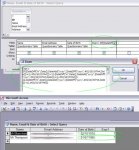Hello all,
I have creadted a .mdb using Access 2003 on a PC Windows XP.
When I look at my Query that I've set up using the Wizard, I've selected it to show the following:
Name
Email Address
Date of Birth
Now what I want todo is to calculate how long until the next birthday.
I did have a go at setting up the following:
Expr1: DateDiff("m",#02/10/1974#,Now())
but that returned the total of months from the year 1974 to present year.
I want to calculate how many months until the next birthday.
Any help would be appriciated, thanks.
Regards Blanchard
I have creadted a .mdb using Access 2003 on a PC Windows XP.
When I look at my Query that I've set up using the Wizard, I've selected it to show the following:
Name
Email Address
Date of Birth
Now what I want todo is to calculate how long until the next birthday.
I did have a go at setting up the following:
Expr1: DateDiff("m",#02/10/1974#,Now())
but that returned the total of months from the year 1974 to present year.
I want to calculate how many months until the next birthday.
Any help would be appriciated, thanks.
Regards Blanchard

